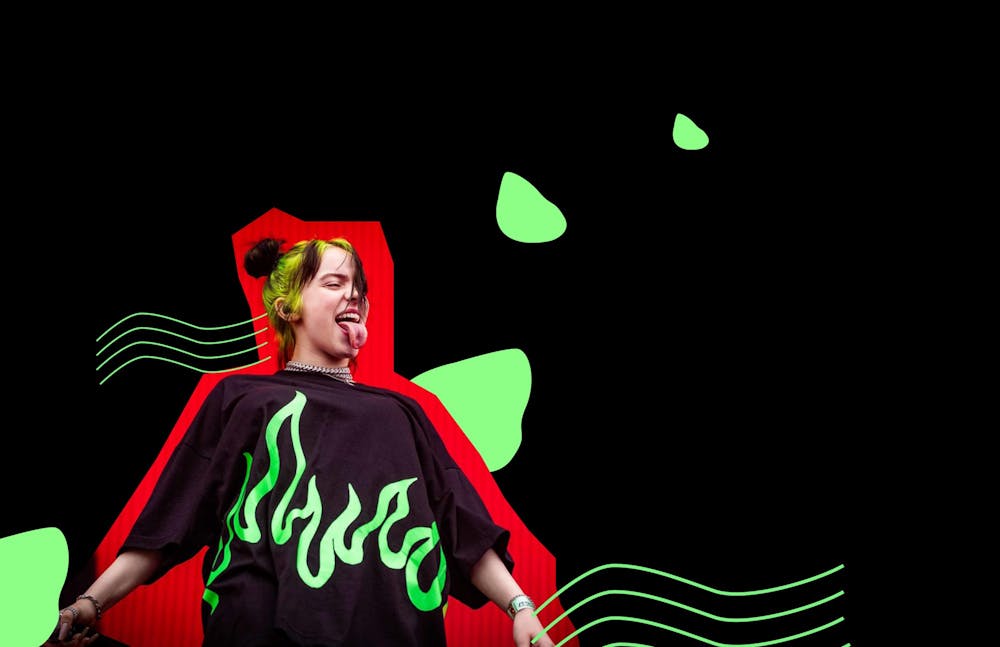On July 24, Billie Eilish broke what seemed to be a month–long Instagram hiatus. She posted a simple photo of herself standing on a dirty roof in her typical baggy sweats and oversized hoodie, the dark grey of her matching set stark against the cotton–candy sky. The caption was brief: “‘my future’ out thursday.”
Surprise song releases have become a staple of these past few months. With social distancing orders forcing many artists to cancel tours and stay at home, it’s understandable that many musicians would turn to their passion of creating new music as a catharsis. As this time allowed for more creativity, it also served as a way to appease disappointed fans and gave them way to pass the time in quarantine. Some big names that have blessed the public with hit tracks include Lady Gaga, Cardi B, Megan Thee Stallion, and Taylor Swift (whose unexpected album release is arguably one of her best).
Therefore, it seems right that the beloved alternative–pop star Billie Eilish—who, among a handful of other titles, is the youngest person to ever win four Grammy categories in a year—would hop on the bandwagon with an unexpected release of her own: “my future.” But the spontaneous release of this stunning single isn’t the only reason this song is a surprise for Eilish fans.
It seems that Eilish is the go–to artist to listen to if you want to feel “emo.” In addition to her permanent mopey expression and grunge–esque wardrobe, her soft falsetto is hypnotic and pained, her lyrics deep and heavy, and her accompanying visuals often disturbing and dark. This is true in music videos such as "when the party’s over" in which her bright blue eyes are transformed into a terrifying onyx and leak ink.
What’s so addictive about Eilish’s music is that, though it can help you wallow in your sadness, there is a universality to the pain she expresses. It is, in a way, tremendously comforting—but not because she is particularly optimistic or uplifting about it. In fact, her single "everything i wanted" spells out her hopelessness. It is a confession for her desire to commit suicide—namely everything she’s “wanted”—but how her brother soothes her by telling her “as long as I’m here, no one can hurt you.”
This is precisely why Eilish’s “my future” was unexpected in more ways than one: It is uncharacteristically hopeful. The ballad is a love song—but not about a lover. It’s about loving oneself, about being comfortable being alone, and about being excited for what the future holds.
The song begins slowly, Eilish’s voice a mix of a whine and a whisper underscored by a soft, bluesy chord progression. At first it seems like she’s singing about a relationship gone wrong, with lines like an accusatory “you don't seem to notice I'm not here” in the first verse. She continues to express her dissatisfaction with this lover in the pre–chorus: “Can't you hear me? / I'm not comin' home / Do you understand? / I've changed my plans.”
But this “change of plans” doesn’t seem to be because Eilish is angry, or has met someone else, or has fallen out of love. It has nothing to do with this other person. It’s simply because, as she sings in the chorus, “I'm in love / With my future…Just wanna get to know myself.”
Immediately after this revelation in the first chorus, the song abruptly picks up and the melodic tune is replaced by a catchy and upbeat percussion, with profoundly thoughtful lines for an 18–year–old: “Know I'm supposed to be unhappy / Without someone (Someone) / But aren't I someone?”
Eilish’s ode to herself and her future couldn’t be more timely. Today’s dismal reality makes the future seem daunting, and, with social distancing guidelines, many of us are spending a lot more time alone. As humans, we need interaction and connection. But alone–time isn’t always a bad thing. Spending time with yourself and learning to find contentment and peace in solitude are also incredibly important for self–growth.
“There’s nothing that talks about how being alone is really powerful and you grow a lot and you learn a lot and, like, it’s not bad, you know?” Eilish said in an interview with Zane Lowe about “my future.” “We should have hope because there’s stuff to look forward to in the future…We don’t know what’s to come.”
There is understandably discomfort and fear that often come with being alone and acknowledging the uncertainty of the future. But what’s often forgotten is that one’s self and one’s future hold tremendous opportunity and potential. Eilish’s song is a much needed reminder of that.







